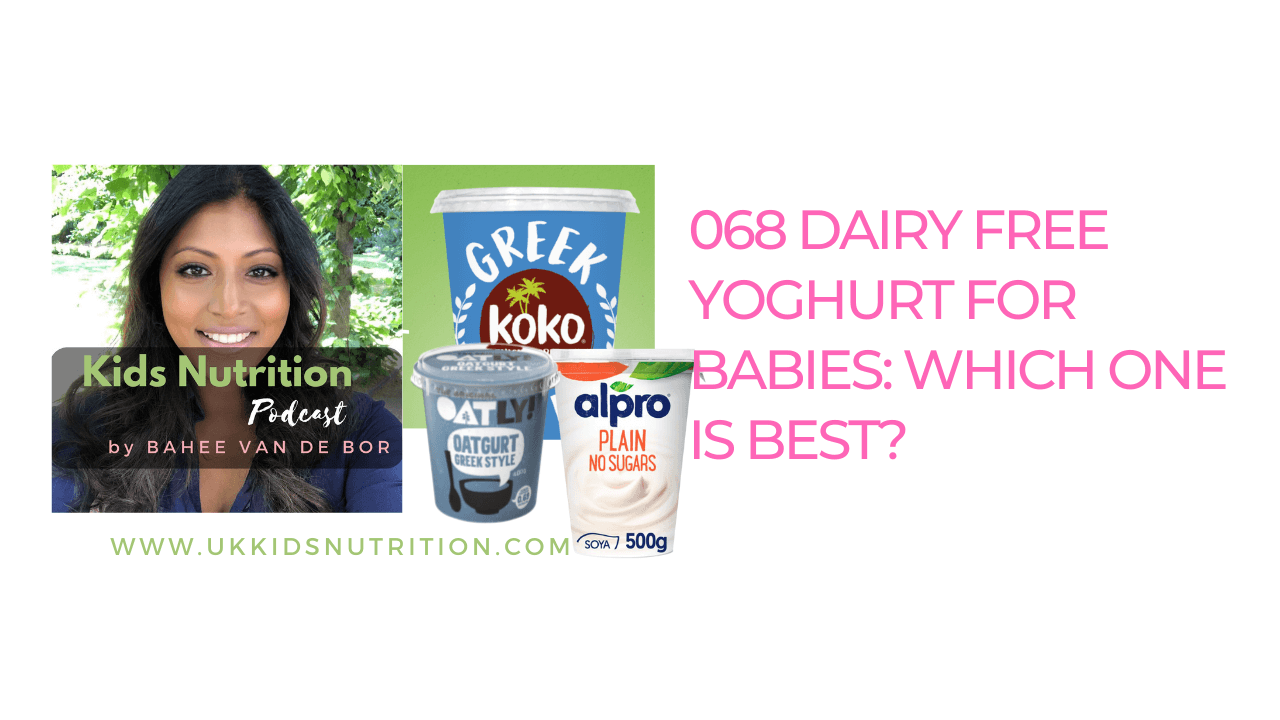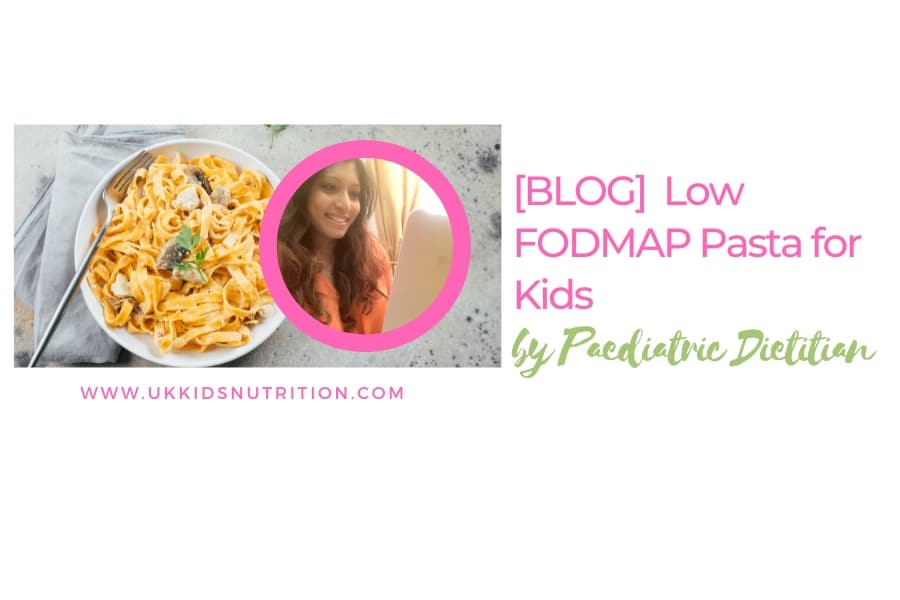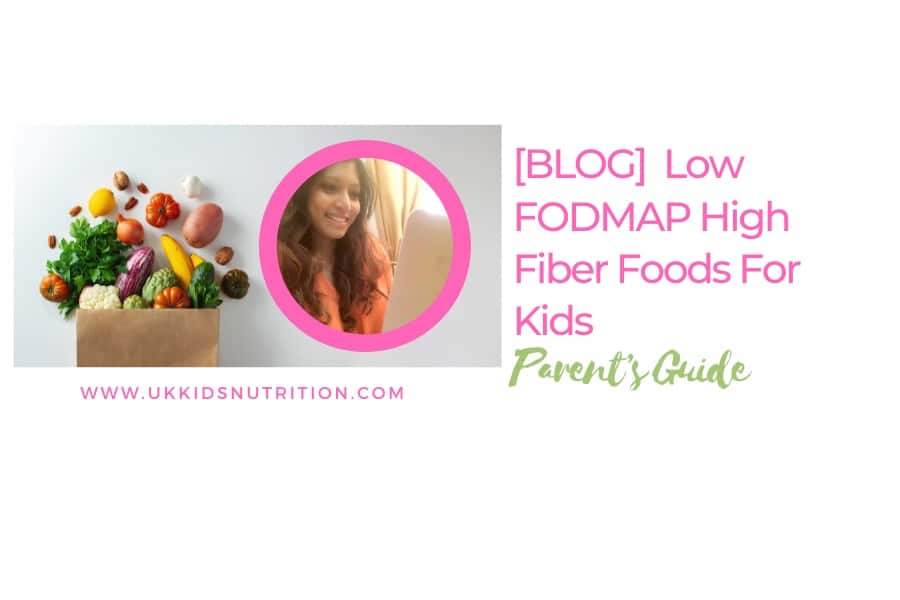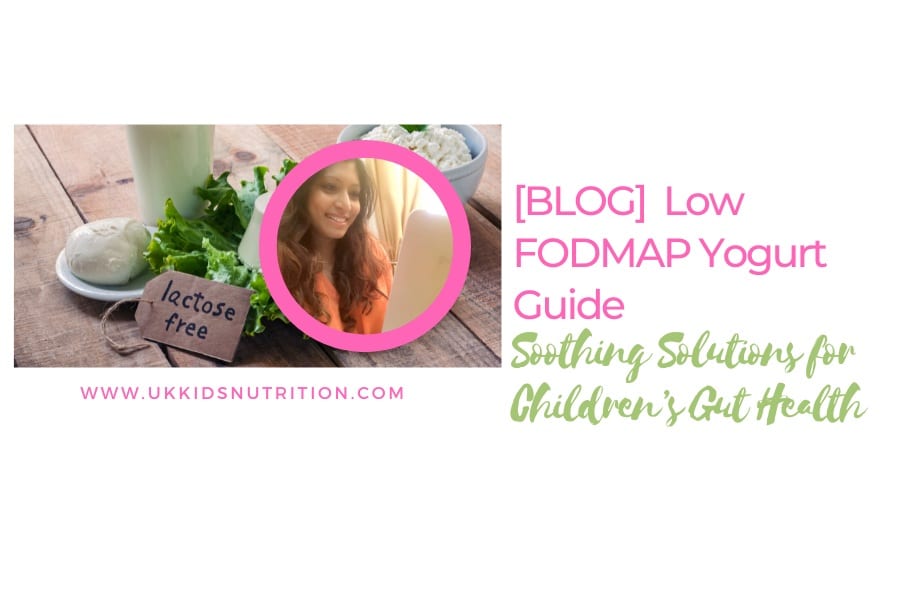Your baby is ready to expand their range of weaning foods but they are on a dairy-free diet.
Now what?
Since regular yoghurt is off the table, will any dairy-free yoghurt for babies suffice?
If you are looking for the best yoghurt for babies that are also dairy-free, then look no further.
Finding the best dairy-free yoghurt for babies can feel like looking for a needle in a haystack. So I’ve done the heavy lifting and nutrition screening for you.
This article will explore a few recommended dairy-free alternatives and why I recommend them for toddlers and babies with cow’s milk protein allergy.
What is cow’s milk protein allergy?
Between 2-4% of children in the UK develop cow’s milk protein allergy.
It occurs when your little one’s body reacts to the proteins found in cow and mammalian milk.
If your child has an immediate reaction to dairy it will present with itchy skin rashes, swelling of the face, eyes or lips, runny nose, coughing, vomiting, eczema and very rarely breathing difficulties.
Other children may experience symptoms after 2 to 48 hours (or longer) of eating solids or drinks with cow’s milk protein.
Symptoms will vary from diarrhoea, constipation, profuse vomiting, and gastro-oesophageal reflux disease to mucus and blood in stools.
If you suspect that your baby has a cow’s milk protein allergy, consult with your family doctor and paediatric dietitian for diagnosis, dietary advice and ongoing management.
Are lactose-free yoghurts suitable for dairy-free babies?
The short answer is no.
Lactose-free yoghurt contains cow’s milk protein.
Lactose-free yoghurts can be suitable for children with lactose intolerance but not for children with cow’s milk protein allergy.
This is because lactose intolerance is a digestive problem (not a food allergy).
Your child may have insufficient amounts of an enzyme called lactase which is needed to break down lactose.
Some of the symptoms of lactose intolerance such as diarrhoea, bloating and tummy pain can be similar to cow milk protein allergy.
But as you can see, they are both different health problems where one is a problem digesting the milk sugar called lactose and the other is an immune response to the protein in cow’s milk.
Learn more about dairy free baby food here.
Lactose free yoghurts can be useful for children with irritable bowel syndrome whereby children experience discomfort, bloating and a change in their poop after eating foods with lactose.
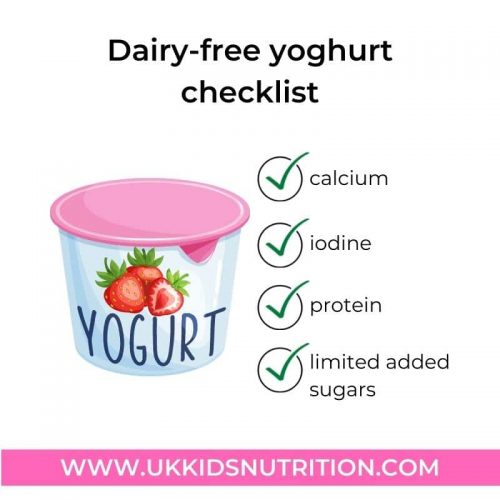
How to choose dairy-free yoghurt for babies under 1
Action on sugar charity regularly calls out baby and toddler snacks that can be loaded with hidden sugar.
Let me explain.
With the use of child-friendly images on the packaging, food brands counteract the high levels of sugar in recipes by fortifying their range with added vitamins and minerals (or deceit and deception as Action on Sugar call it)!
So if you start screening labels of dairy-free yoghurt from the perspective of sugar alone, there will be a limited range available.
When it comes to dairy-free babies or any babies under 1, the recommendation is to avoid or aim for as little sugar per 100g as possible.
But is sugar the only nutrient to look out for when choosing a yoghurt alternative?
Whilst we recommend avoiding foods with added sugar for babies, when it comes to choosing a non-dairy yoghurt for babies, some nutrients will be more important than others.
Let’s take a look at the key nutrients you need to check when selecting a dairy-free yoghurt for babies and toddlers.
- Calcium
- Iodine
- Sugar
- Vitamin D
- B vitamins
- Protein
The main problem is finding a brand of plant-based yoghurt that ticks the boxes for all of the above nutrients.
So let’s prioritise the most important nutrients for babies and toddlers on a dairy-free diet.
In my professional opinion, calcium-fortified dairy-free yoghurt is essential for children on a dairy-free diet.
Organic dairy free yoghurt
For that reason, organic brands of dairy-free yoghurt offer very little nutritional benefit for children.
This is because most organic varieties won’t be fortified with calcium and other vitamins.
You can of course supplement separately with a calcium supplement or make sure that your child is hitting their calcium targets through their specialist infant formula and other calcium-rich foods.
To increase the absorption of calcium, it’s best to offer your baby foods rich in calcium throughout the day versus a single supplement where possible.
Speak to your paediatric dietitian for personalised advice.
Choosing dairy free yoghurt for kids based on sugar
Soy yoghurt for babies
Soy is one of the best plant proteins as it contains all nine essential amino acids for growth.
Plain soy yoghurt for babies is a great option as the protein content in soya-based yoghurt is comparable to cow’s milk-based yoghurt.
And it usually won’t contain added sugar.
This makes plain soy yoghurt a suitable option for babies and toddlers on a milk-free diet.
Are foods that contain soy safe for children?
Once your baby is over the age of 6 months you can include soy foods for children without health consequences.
The only exception to this would be if your child also has an allergy to soy protein.
All other children can safely enjoy soy.
Soy proteins are also rich in high quality protein and are a source of fibre and minerals like iron and zinc.
You can learn more about soy protein in this article ‘Do I Recommend Soy Proteins For A Boy’.
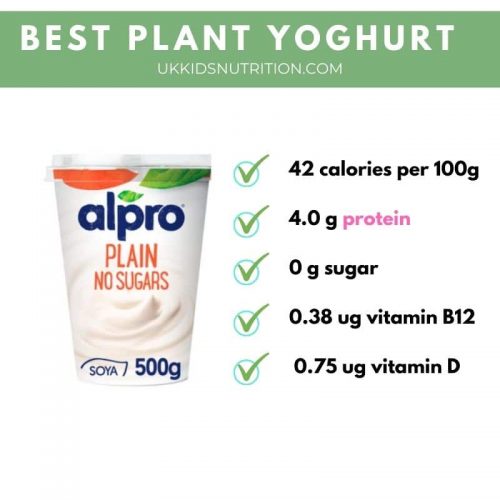
Soy yoghurt alternatives
Alpro Plain No Sugars Yoghurt Alternative
The biggest bonus in this dairy-free range is that there are no added sugars.
It’s perfect for babies and toddlers under 2 years of age.
This dairy-free yoghurt is also fortified with calcium, vitamin D and vitamin B12 ticking many boxes.
The only missing ingredient is iodine.
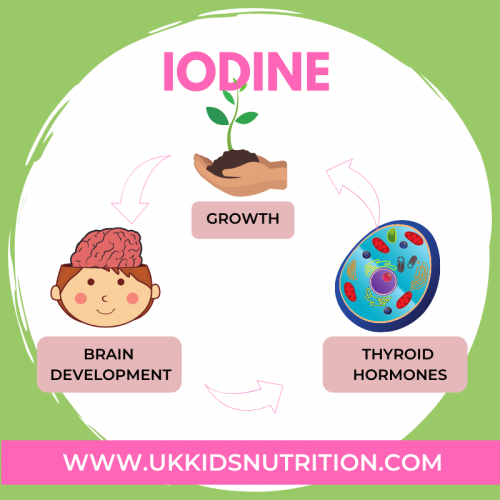
Oat yoghurt for babies and toddlers
Yoghurts that are based on oats also double up as lactose-free yoghurt baby yoghurt.
Always read labels to double-check this, but the following options are suitable dairy-free yoghurt for toddlers.
Oatly Oatgurt Greek Style
This is a great dairy-free alternative to greek yoghurt.
Although the sugars are listed as 4.1g per 100g, the sugars from the oats are created as a result of processing the oats into the ‘yoghurt’ style.
Yes, you could potentially categorise these as ‘free sugars’.
However, I wouldn’t exclude this dairy-free yoghurt for babies on that basis alone.
For example, think about how you plan to serve dairy-free yoghurt.
You might choose to serve it with your baby or toddler’s breakfast cereal and with fresh fruit.
This will affect how slowly the sugars are digested, producing a relatively minimal effect on your child’s blood sugar levels.
What I do love about this yoghurt is that not only is it fortified with calcium, vitamins B and D, but it also contains iodine!
Iodine has an important role in supporting normal cognitive function and in the production of thyroid hormones.
Your baby’s specialist formula or breastmilk will provide the majority of your baby’s nutritional needs.
However, as babies start to drink less formula or breastmilk it’s important to start thinking about solids that will provide equivalent nutrients.
Iodine is naturally occurring in dairy so it’s only logical that dairy-free alternatives fortify their range with this important nutrient.
Learn more about why iodine is important in dairy-free diets in ‘How To Get Enough Iodine In A Dairy Free Diet’.
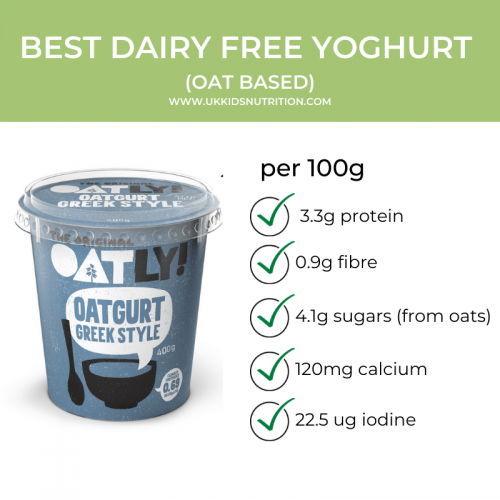
Coconut yoghurt benefits
Koko Plain Unsweetened Alternative
It’s handy to have the option of a dairy, soy and gluten-free dairy yoghurt alternative for children on restricted diets.
This particular range by Koko is brilliant as it’s particularly high in calcium with 160mg of calcium per 100g.
Unfortunately, it is not fortified with iodine but it does contain live cultures and doesn’t contain any added sugars.
You can learn more about probiotics in the article 12 Best Probiotics For Kids.
Koko Greek Style Yoghurt Alternative
This is another suitable alternative with no added sugars with calcium, B and D vitamins.
As it is fortified with vitamin B12, this is a particularly useful range for children following a plant-based diet.
The Greek style yoghurt has a higher protein profile compared to the plain unsweetened alternative in the Koko range.
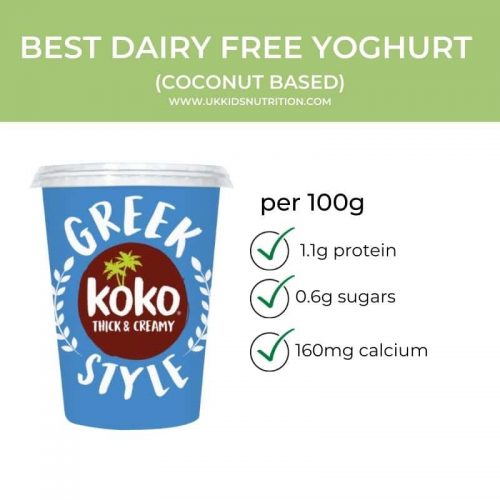
The Coconut Collaborative Kids Pouch
This has been a pleasant find in my hunt for dairy-free yoghurt for babies.
It does however contain 4.6g sugar per 100g from fruit puree and fruit juice.
Despite its packaging implying that it could be offered to babies, I would reserve this for toddlers.
As with any baby foods presented in a pouch, when you can, squeeze the contents of the pouch into a bowl or directly into a spoon.
This range is fortified with 130 mg calcium per 100g, vitamin B12 and vitamin D making it suitable for children on a dairy-free, soy-free and plant-based diet.
Almond yoghurt alternative
Nush Kids Strawberry Almond Tubes
Sadly this isn’t ‘goodness’ in a nutshell as per the company’s tagline.
Arguably the amount of added sugar from fruit puree is small at 2.25g sugar per 100g (compared to its blueberry companion).
Although it does contain live vegan cultures which are great for your child’s gut microbiome, there is no added calcium, iodine, B vitamins or vitamin D.
From that perspective, I’d suggest using a spoonful of almond butter on toast as a kid-friendly nutritious snack instead!

What’s the best dairy-free yoghurt for babies?
As you can see, there isn’t necessarily a ‘best dairy-free yoghurt for babies’.
For our under 2-year-olds, the sugar content per 100g is an important factor when choosing a brand.
The child-friendly packaging and the company’s nutrition marketing messages alone shouldn’t be used to make your decision. Read the nutrition facts table and screen nutrition labels yourself.
You now know that sugar from fruit when changed into a puree, pulp, powder or juice will count as free sugars.
This is because the cellular structure of the fruit or vegetable has been broken down which means that the released sugars will be digested and absorbed quickly.
Free sugars should be limited in your baby and toddler’s diet due to the impact on their dental health and the risk of obesity.
If you’d like to add fruit to your baby or toddler’s dairy-free yoghurt, then use stewed, fresh or frozen fruit.
And remember, always choose a brand that is fortified with calcium (bonus if there’s iodine too)!
Other useful reading:
- Best Plant-Based Milk Alternatives For Your Toddler
- Kid Poop Chart & IBS Explained
- How To Help Constipation in Babies & Toddlers
- 9 Nutritious Snack Ideas For Toddlers
- Lactose Free Yoghurt Guide
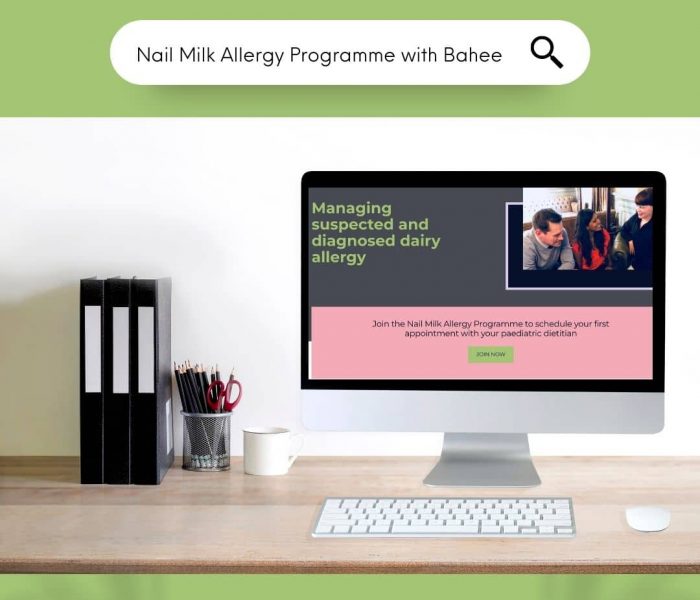
Let Me Help
Would you like to meet a children’s dietitian who has successfully helped families solve their nutrition problems from around the world?
Whether you are worried about a suspected dairy allergy or need help for your child with constipation or diarrhoea, I’ll help you manage these with confidence.
Why not read more about my Nail Milk Allergy Programme here?
